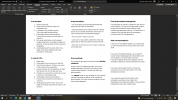Giugiaro
Member
Good evening!
I'm on the process of working on the signage of the "new" Arco coaches by CP and, since we have translation of text to Portuguese, Spanish and English, one of my goals is to use as many precedents as possible.
This is not the first time I come forward to this forum looking for help, so some people may already know what I'm on about.
This time, I have a sign that informs the passenger that the car has AVAC. Is there anything similar in British English?
I'm unsure between the terms "Climate Controlled Coach" or "Air Conditioned Coach", or eventually something else.

I'm on the process of working on the signage of the "new" Arco coaches by CP and, since we have translation of text to Portuguese, Spanish and English, one of my goals is to use as many precedents as possible.
This is not the first time I come forward to this forum looking for help, so some people may already know what I'm on about.
This time, I have a sign that informs the passenger that the car has AVAC. Is there anything similar in British English?
I'm unsure between the terms "Climate Controlled Coach" or "Air Conditioned Coach", or eventually something else.




